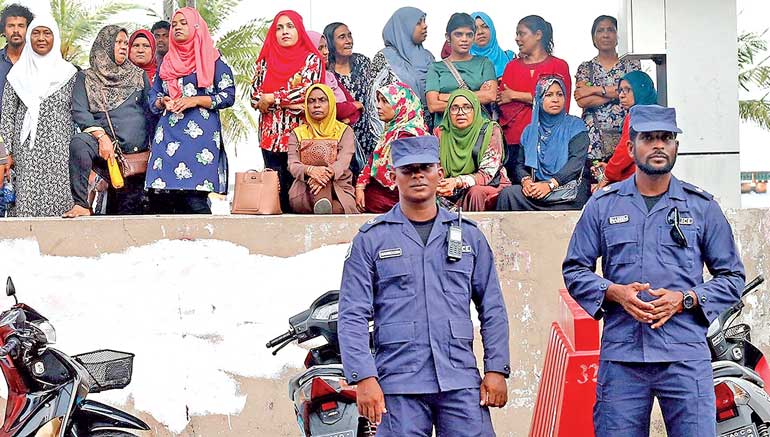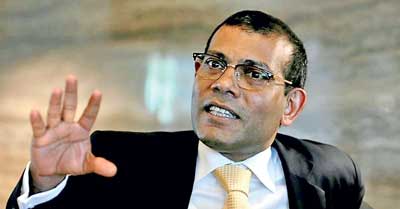Tuesday Feb 24, 2026
Tuesday Feb 24, 2026
Thursday, 8 February 2018 00:01 - - {{hitsCtrl.values.hits}}

MALÉ/COLOMBO (Reuters): The exiled former President of the Maldives yesterday accused authorities of ill-treatment of a Supreme Court judge thrown into prison following the imposition of emergency in the Indian Ocean island nation.
The Maldives has been in crisis since last week, when the Supreme Court quashed convictions ranging from corruption to terrorism of nine opposition figures, including former President Mohamed Nasheed, its first democratically elected leader.
Tension came to a head when President Abdulla Yameen’s government rejected the ruling, imposing an emergency on 5 February and then, in the early hours of 6 February, arresting the chief justice and another judge of the court.
Judge Ali Hameed was being harshly treated, said Nasheed, who was granted asylum by Britain after the Malé government allowed him to leave jail for medical treatment abroad in 2016, in a Twitter post.
Former president Maumoon Abdul Gayoom, 80, who was also arrested in the crackdown and sent to a prison island, had stopped eating, he added.
“I am told President Gayoom is not taking food, while Justice Ali Hameed has been ill-treated,” Nasheed said on Twitter, but gave no further details.
However, Dunya Maumoon, Gayoom’s daughter and a minister of state in Yameen’s administration, rejected Nasheed’s comment about her father, telling Reuters: “I just visited my father. He is keeping well. Nasheed is just spreading rumours.”
Gayoom ruled the Maldives for 30 years until 2008, when Nasheed was elected president, and he now stands with the opposition in the fractious politics of the tropical islands, home to 400,000 people, most of them Muslims. The Maldives, best known for its luxury beach resorts, has assumed greater importance since China began building political and economic ties in its so-called “String of Pearls” strategy to create a network of ports in the Indian Ocean.
Yesterday, China cautioned against any foreign meddling in the islands’ internal affairs, after Maldives’ opposition leaders called for intervention by its rival, India.
“The international community should play a constructive role from a position of respecting the Maldives’ sovereign rights, rather than taking actions that will complicate the situation,” foreign ministry spokesman Geng Shuang said, when asked about the possibility of military intervention.
India, which has historically had greater clout in the islands, located near key shipping lanes, has sought to push back against China’s growing influence.
India, which has expressed concern over the situation, has been silent on the calls for intervention. “We are disturbed by the declaration of a state of emergency in the Maldives, following the refusal of the government to abide by the unanimous ruling of the full bench of the Supreme Court on 1 February, and also by the suspension of constitutional rights,” its foreign ministry said on 6 February.
Since Yameen took power in 2013, his government has faced heavy criticism over the detention of opponents, political influence over the judiciary and the lack of freedom of speech.
Nasheed, who is in the Sri Lankan capital of Colombo, urged India to send an envoy backed by its military to the Maldives to free the political detainees and judges.
He also asked the United States to block financial transactions of government leaders.
“It is essential that India leads the international community in forcing President Yameen to comply with last week’s Supreme Court order,” he wrote in an op-ed article in the Indian Express newspaper yesterday.
Indian intervention in the Maldives, about 400 km (249 miles) away, would not be unprecedented, as New Delhi sent troops in 1988 to foil a coup. But it has since avoided getting dragged into the island’s politics.
Yameen, the half-brother of former president Gayoom, said his actions were designed to stop a coup and suggested that two senior judges acted against him because law enforcement officials were investigating them for graft.
On 6 February, the three judges who are still free reversed the Supreme Court’s decision to drop charges against the nine political dissidents, the court said on its website.
Singapore on 6 February issued an advisory to citizens against non-essential travel to the Maldives, following similar measures by China, India and the United States.